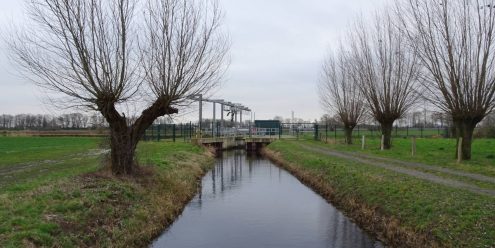
It was 1914, there was a world war being fought, and a clever man thought he had found a way to smuggle a horse.
In that year, exporting horses from Azewijn, in the neutral Netherlands, to warring Germany was illegal. As local newspaper De Graafschap-bode told the story at the time:
L. Lueb, 32 years of age and farmer in Klein Netterden (Germany) is being tried for exporting a horse on 7 September 1914 from the municipality of Bergh across the border at Klein Netterden, by pulling said animal through the water of said canal towards the place from which he was pulling whilst standing on the German side of the border canal while the horse was on the other side of said canal, with clear intent and by means of a rope tied around the neck of said horse.
People used so many words in those days…
The courts could just smell that Mr Lueb was guilty, but legally, a whiff is not enough. A law needs to be found by which to convict a person. But more than that, they had to agree they had jurisdiction. The law rarely determines that somebody can be tried for something they did in another country.
The result was that the case ended up before the Dutch supreme court.
The original court held that not the location of the perpetrator, but rather the ‘exportable object’ determined the location of the crime, Haal Je Recht writes.
The appeals court disagreed and came up with a post-human solution: the rope is an extension of the arm, and the arm was on Dutch soil at the time of the crime. The Dutch supreme court reworded the verdict, but came pretty much to the same conclusion: one can use an instrument to act in a different place from where one currently is.
In our current day and age, it has become much easier to use an instrument to act in a different place. The supreme court referenced the Case of the Horse of Azewijn as recent as last year when it convicted skimmers who had tried to plunder Dutch bank accounts from an ATM in Milan, Italy.
In 1915, Mr Lueb was convicted to a prison sentence of three months. What happened to the horse, I don’t know.
Photo of he German – Dutch border canal near Netterden by Pieter Delicaat, some rights reserved.
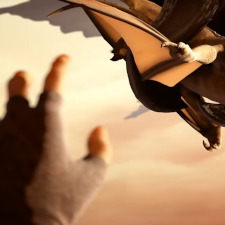 This 12 minute short film follows a young woman called Sintel as she tries to track down the creature that abducted her pet dragon, Scales.
This 12 minute short film follows a young woman called Sintel as she tries to track down the creature that abducted her pet dragon, Scales. 
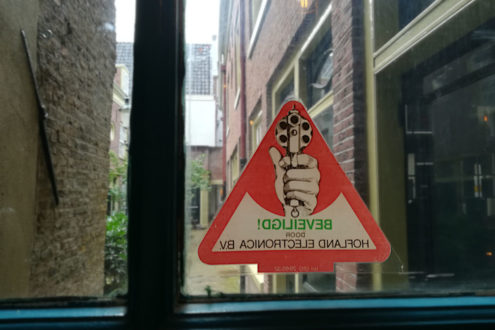 Orangemaster and I came across this sticker on a window overlooking the back alley of taco bar Mr. Haz in the Jordaan neighbourhood of Amsterdam.
Orangemaster and I came across this sticker on a window overlooking the back alley of taco bar Mr. Haz in the Jordaan neighbourhood of Amsterdam. Like every year I present you my favourite stories of the past twelve months.
Like every year I present you my favourite stories of the past twelve months. In 2008 we joined Flickr, a photo sharing site that was also one of the first social networks. Shortly after we switched to their Pro account because it made sense at the time – back then it looked like we might soon be bumping into the limits of the free account.
In 2008 we joined Flickr, a photo sharing site that was also one of the first social networks. Shortly after we switched to their Pro account because it made sense at the time – back then it looked like we might soon be bumping into the limits of the free account.

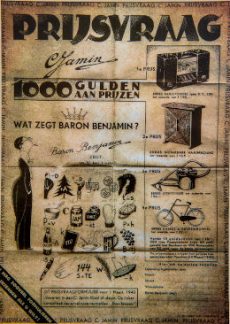 In 1940 a then 11-year old Tjits Drenth solved a rebus of the Jamin candy chain store, but then the war broke out and she either forgot or ignored the competition.
In 1940 a then 11-year old Tjits Drenth solved a rebus of the Jamin candy chain store, but then the war broke out and she either forgot or ignored the competition.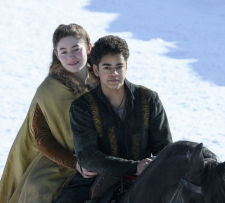 On 20 March 2020, Netflix will start running its mini-series The Letter for the King based on the 1962 children’s book of the same name by Tonke Dragt.
On 20 March 2020, Netflix will start running its mini-series The Letter for the King based on the 1962 children’s book of the same name by Tonke Dragt.  The year 2019 in review for 24 Oranges starts with one of the coolest stories I have read in a while: microscope pioneer
The year 2019 in review for 24 Oranges starts with one of the coolest stories I have read in a while: microscope pioneer 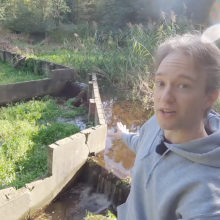 YouTuber Tom Scott visited the Waterloopbos in Marknesse in the Noordoostpolder and had a little chat with Leo van Rijn, a specialist in modelling the flow of watercourses.
YouTuber Tom Scott visited the Waterloopbos in Marknesse in the Noordoostpolder and had a little chat with Leo van Rijn, a specialist in modelling the flow of watercourses.